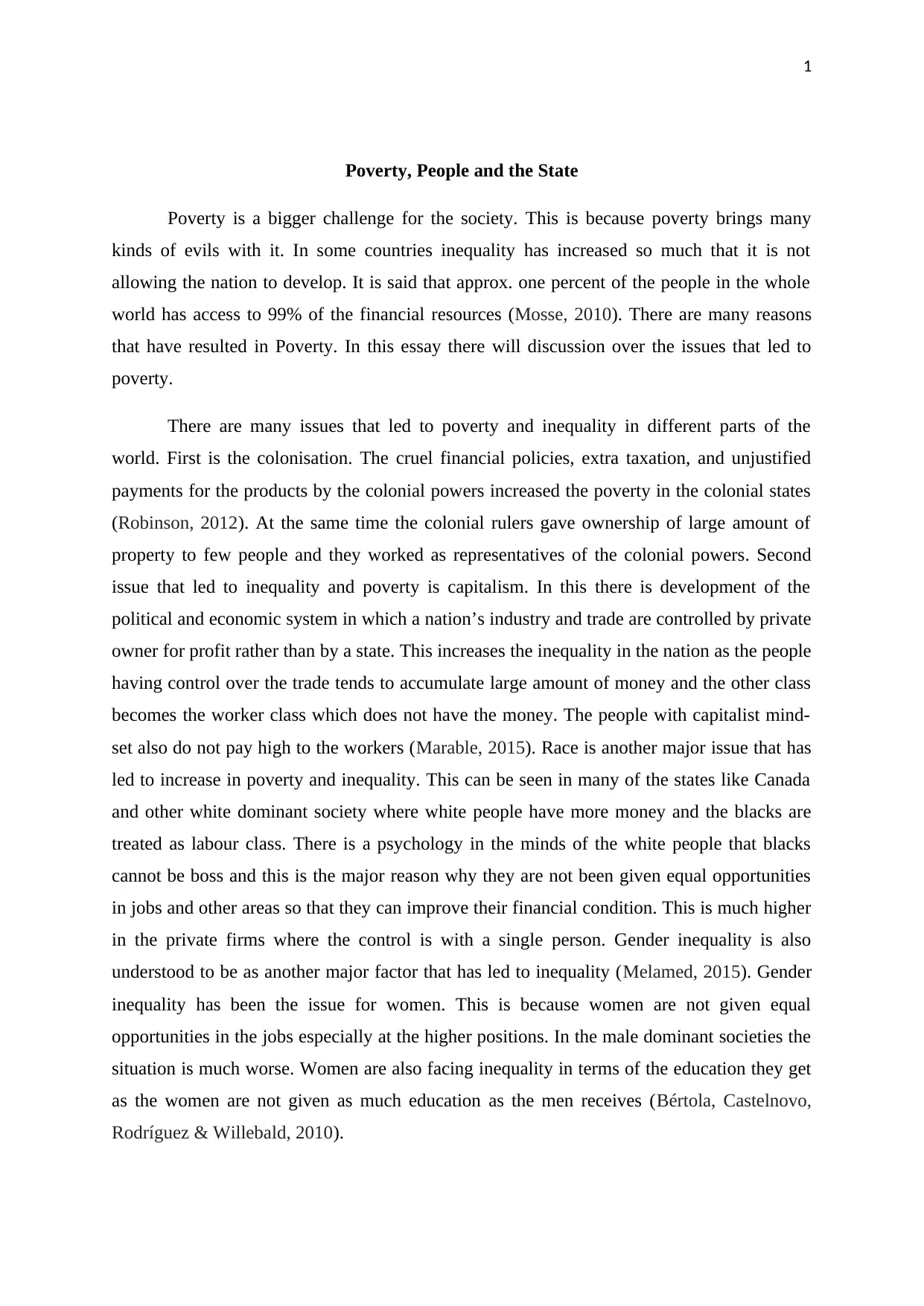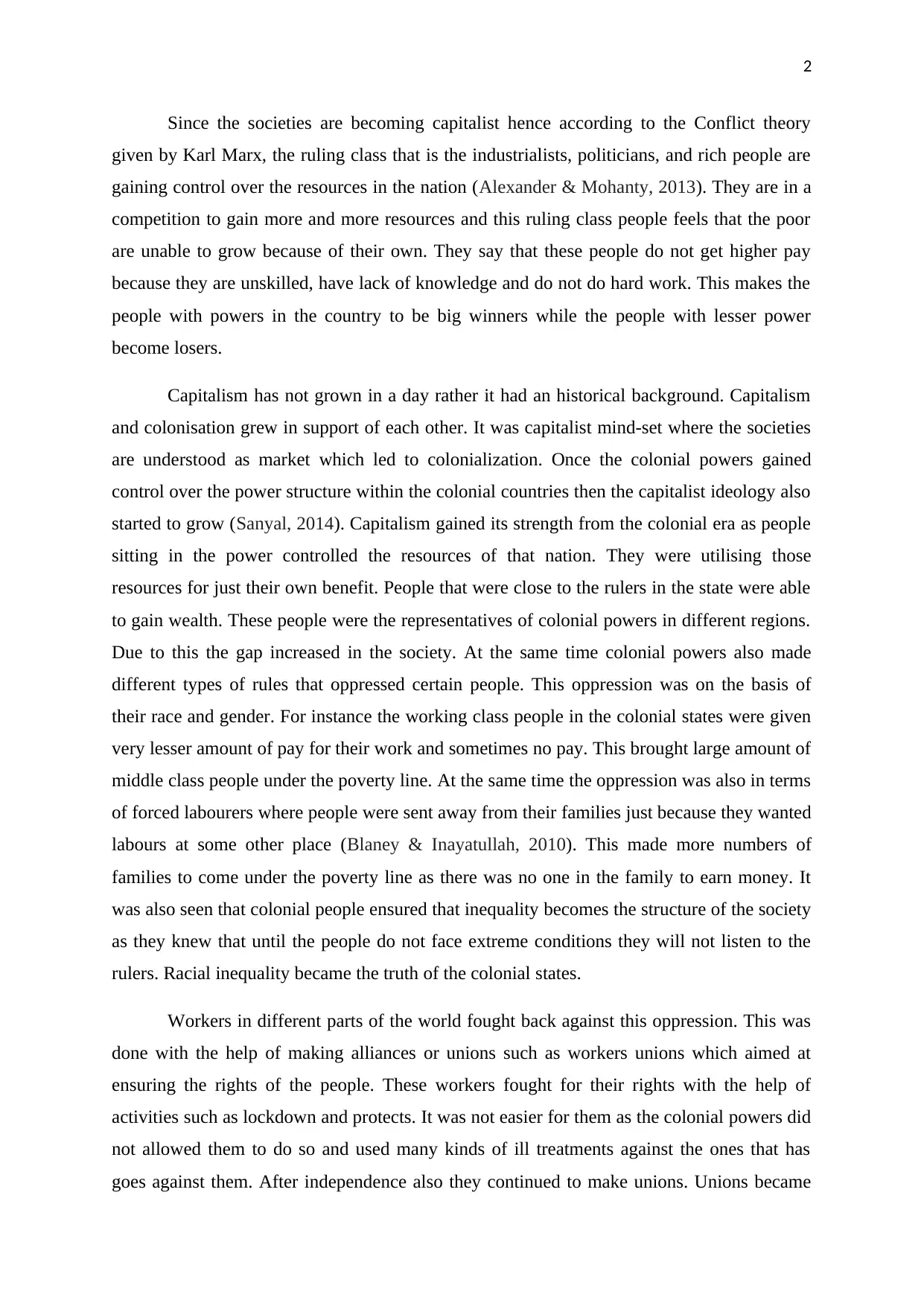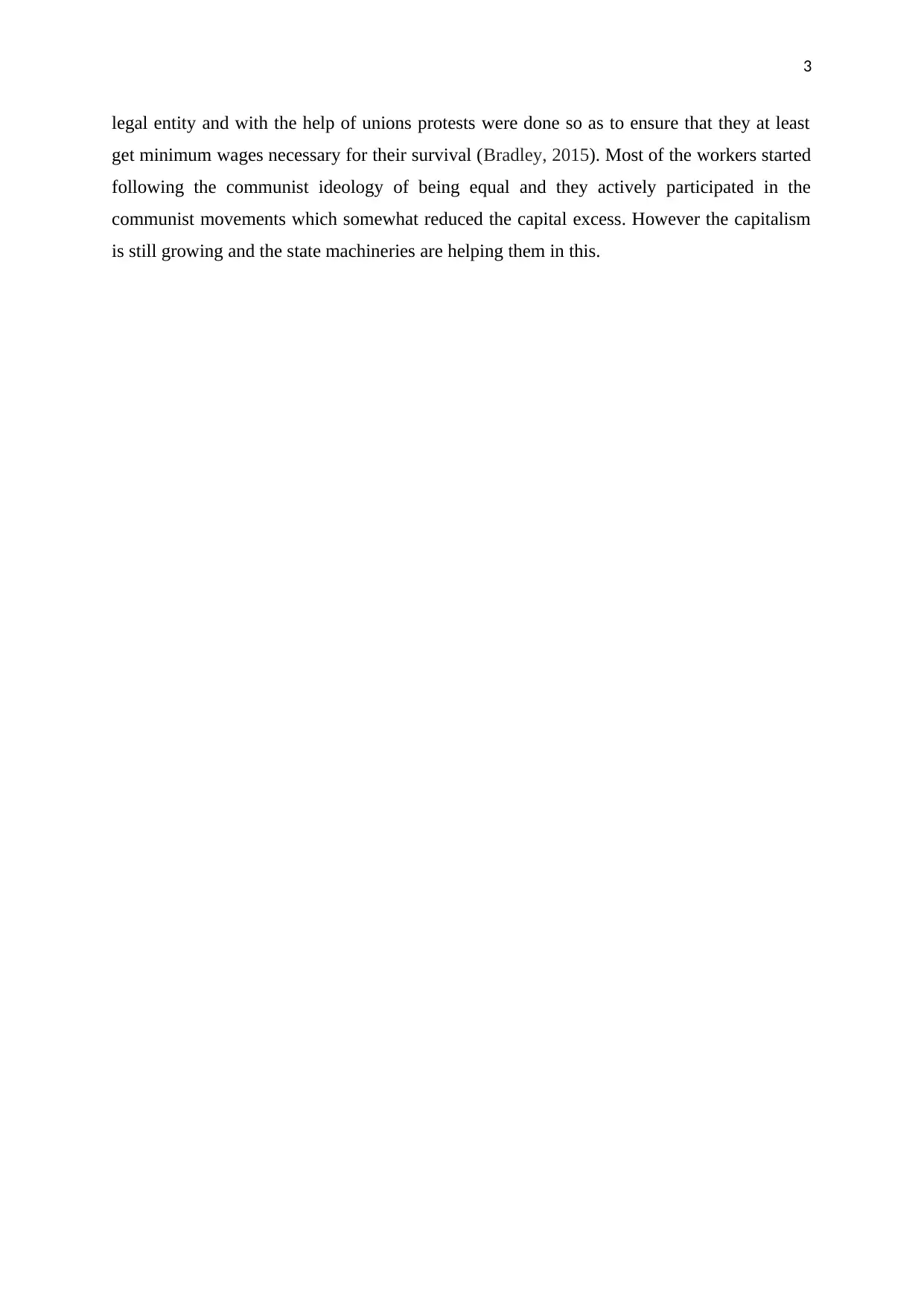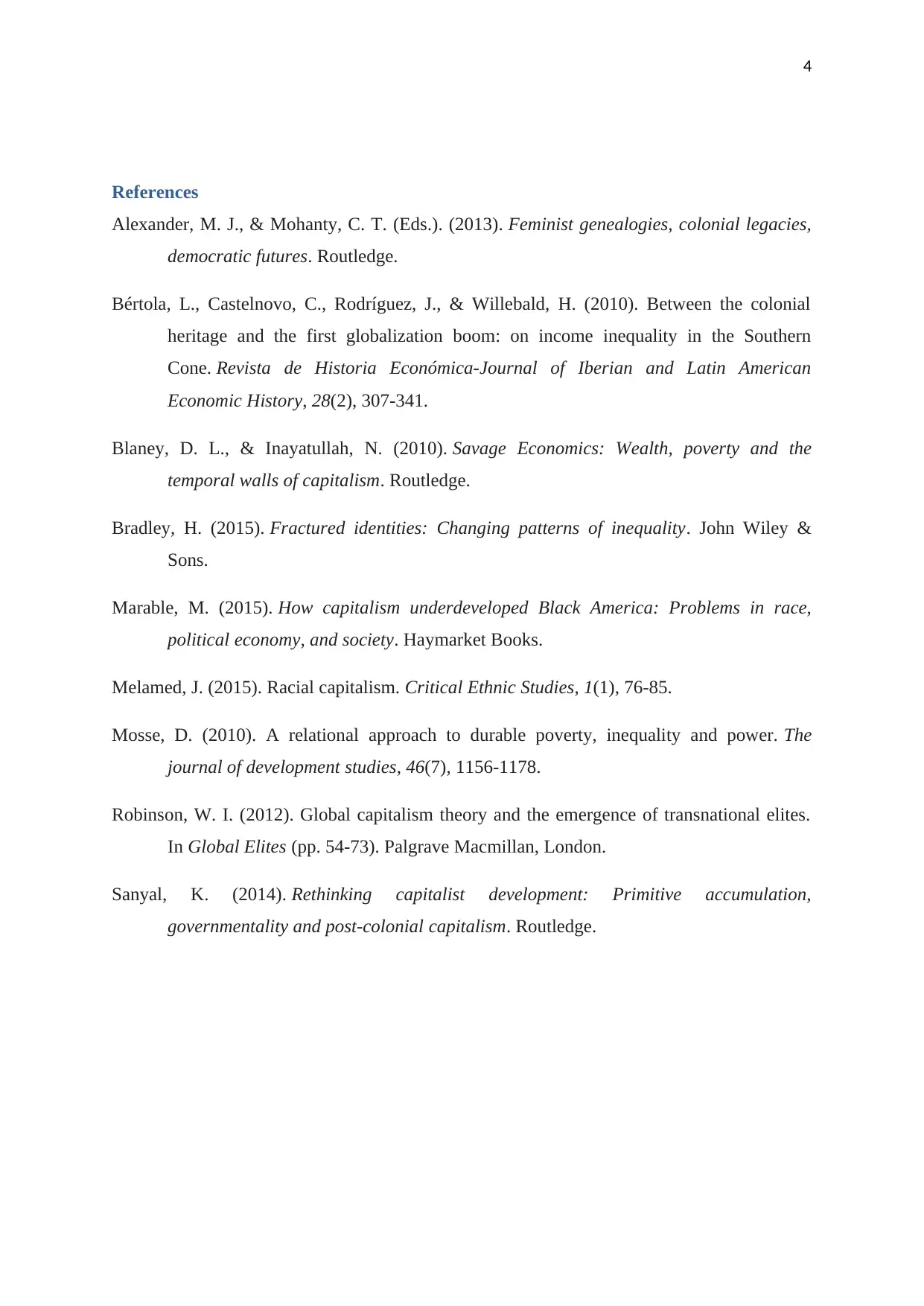Essay on Poverty: Historical Perspectives and Societal Impacts
VerifiedAdded on 2022/09/09
|5
|1366
|16
Essay
AI Summary
This essay delves into the multifaceted issue of poverty, examining its historical roots and societal impacts. It identifies key contributing factors such as colonialism, which imposed exploitative financial policies and unequal land distribution, and capitalism, which concentrates wealth and often marginalizes workers. The essay also explores how racial and gender inequalities exacerbate poverty, citing examples of systemic discrimination in employment and education. Drawing upon conflict theory, it analyzes how the ruling class benefits from the existing economic structure. The essay further discusses the historical interplay between colonialism and capitalism, highlighting how colonial powers shaped economic structures to their advantage. It also covers the resistance of workers through unions and movements. The essay concludes by emphasizing the ongoing challenges of poverty and inequality and the need for continued efforts to address these issues.

HISTORY
Paraphrase This Document
Need a fresh take? Get an instant paraphrase of this document with our AI Paraphraser

1
Poverty, People and the State
Poverty is a bigger challenge for the society. This is because poverty brings many
kinds of evils with it. In some countries inequality has increased so much that it is not
allowing the nation to develop. It is said that approx. one percent of the people in the whole
world has access to 99% of the financial resources (Mosse, 2010). There are many reasons
that have resulted in Poverty. In this essay there will discussion over the issues that led to
poverty.
There are many issues that led to poverty and inequality in different parts of the
world. First is the colonisation. The cruel financial policies, extra taxation, and unjustified
payments for the products by the colonial powers increased the poverty in the colonial states
(Robinson, 2012). At the same time the colonial rulers gave ownership of large amount of
property to few people and they worked as representatives of the colonial powers. Second
issue that led to inequality and poverty is capitalism. In this there is development of the
political and economic system in which a nation’s industry and trade are controlled by private
owner for profit rather than by a state. This increases the inequality in the nation as the people
having control over the trade tends to accumulate large amount of money and the other class
becomes the worker class which does not have the money. The people with capitalist mind-
set also do not pay high to the workers (Marable, 2015). Race is another major issue that has
led to increase in poverty and inequality. This can be seen in many of the states like Canada
and other white dominant society where white people have more money and the blacks are
treated as labour class. There is a psychology in the minds of the white people that blacks
cannot be boss and this is the major reason why they are not been given equal opportunities
in jobs and other areas so that they can improve their financial condition. This is much higher
in the private firms where the control is with a single person. Gender inequality is also
understood to be as another major factor that has led to inequality (Melamed, 2015). Gender
inequality has been the issue for women. This is because women are not given equal
opportunities in the jobs especially at the higher positions. In the male dominant societies the
situation is much worse. Women are also facing inequality in terms of the education they get
as the women are not given as much education as the men receives (Bértola, Castelnovo,
Rodríguez & Willebald, 2010).
Poverty, People and the State
Poverty is a bigger challenge for the society. This is because poverty brings many
kinds of evils with it. In some countries inequality has increased so much that it is not
allowing the nation to develop. It is said that approx. one percent of the people in the whole
world has access to 99% of the financial resources (Mosse, 2010). There are many reasons
that have resulted in Poverty. In this essay there will discussion over the issues that led to
poverty.
There are many issues that led to poverty and inequality in different parts of the
world. First is the colonisation. The cruel financial policies, extra taxation, and unjustified
payments for the products by the colonial powers increased the poverty in the colonial states
(Robinson, 2012). At the same time the colonial rulers gave ownership of large amount of
property to few people and they worked as representatives of the colonial powers. Second
issue that led to inequality and poverty is capitalism. In this there is development of the
political and economic system in which a nation’s industry and trade are controlled by private
owner for profit rather than by a state. This increases the inequality in the nation as the people
having control over the trade tends to accumulate large amount of money and the other class
becomes the worker class which does not have the money. The people with capitalist mind-
set also do not pay high to the workers (Marable, 2015). Race is another major issue that has
led to increase in poverty and inequality. This can be seen in many of the states like Canada
and other white dominant society where white people have more money and the blacks are
treated as labour class. There is a psychology in the minds of the white people that blacks
cannot be boss and this is the major reason why they are not been given equal opportunities
in jobs and other areas so that they can improve their financial condition. This is much higher
in the private firms where the control is with a single person. Gender inequality is also
understood to be as another major factor that has led to inequality (Melamed, 2015). Gender
inequality has been the issue for women. This is because women are not given equal
opportunities in the jobs especially at the higher positions. In the male dominant societies the
situation is much worse. Women are also facing inequality in terms of the education they get
as the women are not given as much education as the men receives (Bértola, Castelnovo,
Rodríguez & Willebald, 2010).

2
Since the societies are becoming capitalist hence according to the Conflict theory
given by Karl Marx, the ruling class that is the industrialists, politicians, and rich people are
gaining control over the resources in the nation (Alexander & Mohanty, 2013). They are in a
competition to gain more and more resources and this ruling class people feels that the poor
are unable to grow because of their own. They say that these people do not get higher pay
because they are unskilled, have lack of knowledge and do not do hard work. This makes the
people with powers in the country to be big winners while the people with lesser power
become losers.
Capitalism has not grown in a day rather it had an historical background. Capitalism
and colonisation grew in support of each other. It was capitalist mind-set where the societies
are understood as market which led to colonialization. Once the colonial powers gained
control over the power structure within the colonial countries then the capitalist ideology also
started to grow (Sanyal, 2014). Capitalism gained its strength from the colonial era as people
sitting in the power controlled the resources of that nation. They were utilising those
resources for just their own benefit. People that were close to the rulers in the state were able
to gain wealth. These people were the representatives of colonial powers in different regions.
Due to this the gap increased in the society. At the same time colonial powers also made
different types of rules that oppressed certain people. This oppression was on the basis of
their race and gender. For instance the working class people in the colonial states were given
very lesser amount of pay for their work and sometimes no pay. This brought large amount of
middle class people under the poverty line. At the same time the oppression was also in terms
of forced labourers where people were sent away from their families just because they wanted
labours at some other place (Blaney & Inayatullah, 2010). This made more numbers of
families to come under the poverty line as there was no one in the family to earn money. It
was also seen that colonial people ensured that inequality becomes the structure of the society
as they knew that until the people do not face extreme conditions they will not listen to the
rulers. Racial inequality became the truth of the colonial states.
Workers in different parts of the world fought back against this oppression. This was
done with the help of making alliances or unions such as workers unions which aimed at
ensuring the rights of the people. These workers fought for their rights with the help of
activities such as lockdown and protects. It was not easier for them as the colonial powers did
not allowed them to do so and used many kinds of ill treatments against the ones that has
goes against them. After independence also they continued to make unions. Unions became
Since the societies are becoming capitalist hence according to the Conflict theory
given by Karl Marx, the ruling class that is the industrialists, politicians, and rich people are
gaining control over the resources in the nation (Alexander & Mohanty, 2013). They are in a
competition to gain more and more resources and this ruling class people feels that the poor
are unable to grow because of their own. They say that these people do not get higher pay
because they are unskilled, have lack of knowledge and do not do hard work. This makes the
people with powers in the country to be big winners while the people with lesser power
become losers.
Capitalism has not grown in a day rather it had an historical background. Capitalism
and colonisation grew in support of each other. It was capitalist mind-set where the societies
are understood as market which led to colonialization. Once the colonial powers gained
control over the power structure within the colonial countries then the capitalist ideology also
started to grow (Sanyal, 2014). Capitalism gained its strength from the colonial era as people
sitting in the power controlled the resources of that nation. They were utilising those
resources for just their own benefit. People that were close to the rulers in the state were able
to gain wealth. These people were the representatives of colonial powers in different regions.
Due to this the gap increased in the society. At the same time colonial powers also made
different types of rules that oppressed certain people. This oppression was on the basis of
their race and gender. For instance the working class people in the colonial states were given
very lesser amount of pay for their work and sometimes no pay. This brought large amount of
middle class people under the poverty line. At the same time the oppression was also in terms
of forced labourers where people were sent away from their families just because they wanted
labours at some other place (Blaney & Inayatullah, 2010). This made more numbers of
families to come under the poverty line as there was no one in the family to earn money. It
was also seen that colonial people ensured that inequality becomes the structure of the society
as they knew that until the people do not face extreme conditions they will not listen to the
rulers. Racial inequality became the truth of the colonial states.
Workers in different parts of the world fought back against this oppression. This was
done with the help of making alliances or unions such as workers unions which aimed at
ensuring the rights of the people. These workers fought for their rights with the help of
activities such as lockdown and protects. It was not easier for them as the colonial powers did
not allowed them to do so and used many kinds of ill treatments against the ones that has
goes against them. After independence also they continued to make unions. Unions became
⊘ This is a preview!⊘
Do you want full access?
Subscribe today to unlock all pages.

Trusted by 1+ million students worldwide

3
legal entity and with the help of unions protests were done so as to ensure that they at least
get minimum wages necessary for their survival (Bradley, 2015). Most of the workers started
following the communist ideology of being equal and they actively participated in the
communist movements which somewhat reduced the capital excess. However the capitalism
is still growing and the state machineries are helping them in this.
legal entity and with the help of unions protests were done so as to ensure that they at least
get minimum wages necessary for their survival (Bradley, 2015). Most of the workers started
following the communist ideology of being equal and they actively participated in the
communist movements which somewhat reduced the capital excess. However the capitalism
is still growing and the state machineries are helping them in this.
Paraphrase This Document
Need a fresh take? Get an instant paraphrase of this document with our AI Paraphraser

4
References
Alexander, M. J., & Mohanty, C. T. (Eds.). (2013). Feminist genealogies, colonial legacies,
democratic futures. Routledge.
Bértola, L., Castelnovo, C., Rodríguez, J., & Willebald, H. (2010). Between the colonial
heritage and the first globalization boom: on income inequality in the Southern
Cone. Revista de Historia Económica-Journal of Iberian and Latin American
Economic History, 28(2), 307-341.
Blaney, D. L., & Inayatullah, N. (2010). Savage Economics: Wealth, poverty and the
temporal walls of capitalism. Routledge.
Bradley, H. (2015). Fractured identities: Changing patterns of inequality. John Wiley &
Sons.
Marable, M. (2015). How capitalism underdeveloped Black America: Problems in race,
political economy, and society. Haymarket Books.
Melamed, J. (2015). Racial capitalism. Critical Ethnic Studies, 1(1), 76-85.
Mosse, D. (2010). A relational approach to durable poverty, inequality and power. The
journal of development studies, 46(7), 1156-1178.
Robinson, W. I. (2012). Global capitalism theory and the emergence of transnational elites.
In Global Elites (pp. 54-73). Palgrave Macmillan, London.
Sanyal, K. (2014). Rethinking capitalist development: Primitive accumulation,
governmentality and post-colonial capitalism. Routledge.
References
Alexander, M. J., & Mohanty, C. T. (Eds.). (2013). Feminist genealogies, colonial legacies,
democratic futures. Routledge.
Bértola, L., Castelnovo, C., Rodríguez, J., & Willebald, H. (2010). Between the colonial
heritage and the first globalization boom: on income inequality in the Southern
Cone. Revista de Historia Económica-Journal of Iberian and Latin American
Economic History, 28(2), 307-341.
Blaney, D. L., & Inayatullah, N. (2010). Savage Economics: Wealth, poverty and the
temporal walls of capitalism. Routledge.
Bradley, H. (2015). Fractured identities: Changing patterns of inequality. John Wiley &
Sons.
Marable, M. (2015). How capitalism underdeveloped Black America: Problems in race,
political economy, and society. Haymarket Books.
Melamed, J. (2015). Racial capitalism. Critical Ethnic Studies, 1(1), 76-85.
Mosse, D. (2010). A relational approach to durable poverty, inequality and power. The
journal of development studies, 46(7), 1156-1178.
Robinson, W. I. (2012). Global capitalism theory and the emergence of transnational elites.
In Global Elites (pp. 54-73). Palgrave Macmillan, London.
Sanyal, K. (2014). Rethinking capitalist development: Primitive accumulation,
governmentality and post-colonial capitalism. Routledge.
1 out of 5
Related Documents
Your All-in-One AI-Powered Toolkit for Academic Success.
+13062052269
info@desklib.com
Available 24*7 on WhatsApp / Email
![[object Object]](/_next/static/media/star-bottom.7253800d.svg)
Unlock your academic potential
Copyright © 2020–2026 A2Z Services. All Rights Reserved. Developed and managed by ZUCOL.





